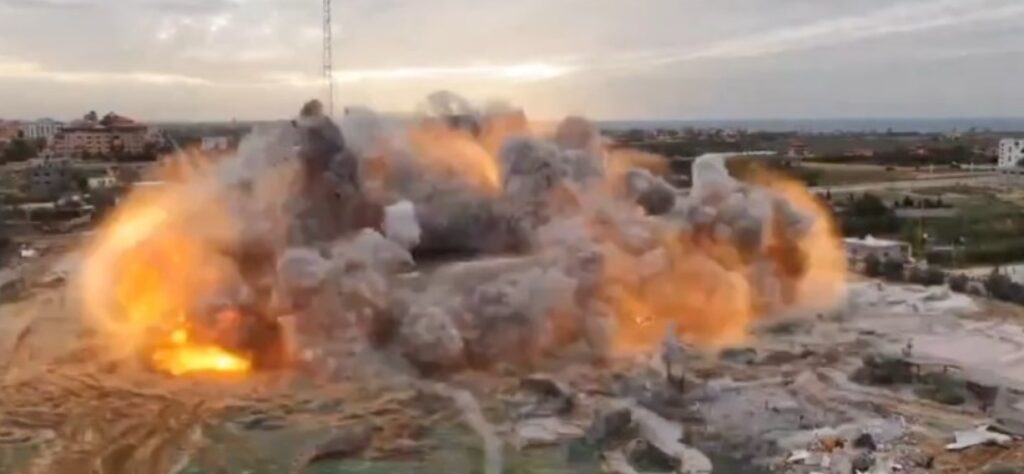The savage war that Israel is conducting against the population of Gaza will have profound and lasting effects throughout the Middle East, including Israel. The prime aim of the Western powers is to contain the fall-out from that war, but it is not something that is entirely within their control.
“It is time to stop talking about the risk that the war in Gaza will spread elsewhere in the Middle East”, wrote the BBC international editor last week. “It has already happened.” Bowen was referring to the fact that the UK and USA had bombed military sites in Yemen, in response to attacks on shipping off the Yemeni coast. Since then, the USA has bombed Yemen three more times.
But in all likelihood, the Houthis, who control most of the North and West of Yemen, including the capital Sanaa, will continue their harassment of shipping. They have explicitly declared that their aim is to disrupt traffic that in any way supports the Israelis’ war on the Palestinian people. They are unlikely to be deterred by the bombing raids, having suffered an eight-year bombing campaign by the Saudi government (there is now a cease-fire); and yet they have survived as strong as ever.
The West coast of Yemen lies alongside the Bab al-Mandab Strait, at the mouth of Red Sea, and leading to the Suez Canal. Normally, around 15% of global sea traffic goes through the Canal, including around 30% of the world’s ship-borne containers. As a result of the perceived danger, a large number of ships have been diverted to the longer route around the Southern tip of Africa.
Thousands of ships diverted around the Southern tip of Africa
This will have an impact on Egypt, which gets considerable income from transit through the Canal, although its President, Al-Sisi, has not complained too loudly because of the need to be seen to support Gaza. But it will also have wider economic impacts. There have already been knock-on effects to supply chains to Europe and in at least one case it has been sufficient to affect car production.
But that is not all. The US also has armed forces in both Iraq and Syria, in the former case against the wishes of the population, but in the latter case even against the wishes of the government. And when these US forces have come under attack, the US response has been to bomb the bases of those armed groups from whom, their intelligence tells them, attacks have come.
Further East still, the Iranian and Pakistani governments have exchanged bombing raids across one another’s borders, in both cases, allegedly, to attack ‘terrorist’ groups on the other’s territory. This may not be related to the war on Gaza, but it adds to an atmosphere of impending conflict in the region.

Perhaps the most obvious place where the Gaza war could escalate is to the North of Israel, where the Lebanese Hizbollah – the best armed of any non-state militia in the world – is exchanging regular rocket and artillery fire with the Israeli Defence Force. As a result of this ongoing ‘low-key’ war, thousands of Israelis have had to be evacuated from towns in the North.
It would appear that the policy of Israel is to provoke Hezbollah as much as they possibly can. After taking out one of the political leaders of Hamas with a drone attack on an apartment building in Beirut three weeks ago, they have followed that up with the assassination of two Hezbollah leaders. Senior Iranian officials operating as military advisers in Syria have also been assassinated by Israel.
Hezbollah is a well-armed force, battle-hardened in Syria
Hezbollah, it should be noted, may not have the fire-power of the IDF, but nonetheless, it is not a rag-tage bunch of amateurs. It is a very well-armed militia and many of its forces have war experience, fighting on the side of the government in the Syrian civil war.
It sometimes seems only a matter of time before Hezbollah makes serious moves to exact the ‘revenge’ on Israel that its leaders have long promised. If that were to happen, it would open up a front for Israel far more dangerous, both militarily and above all politically, than the one-sided war on Gaza. A wider war, in other words, is already developing, although how far it reaches remains to be seen.
In Gaza, around 30,000 people have now been killed by Israeli high explosives, a third of them children, and overwhelmingly non-combatants. Those who are still surviving are gripped by a humanitarian crisis of staggering proportions, with food, medicines, water and other necessities deliberately denied by Israeli guns and aircraft.
Israel is systematically turning Gaza into a sea of rubble, so the whole area is unfit for use. The most recent example of Israel’s wanton destruction was this week’s complete demolition – with planted charges – of the Al-Israa university campus, which had no military or strategic value whatsoever. Whatever is said in public, the entire thrust of Israeli policy is to make Gaza uninhabitable, and to drive the Palestinian population out of the territory and into Egypt.
The concerns expressed by Western politicians for the suffering of Palestinians are only for the cameras. In reality, they couldn’t care less; but they have to say something because they have registered the huge shift in public opinion that is taking place against Israel and its one-sided war on Gaza.
Israel has been ‘an unsinkable aircraft carrier’
Meanwhile, these same politicians continue to send arms to Israel. Their chief concern, above all else, is ‘stability’ in the region, so that Israel and tame Arab governments can continue to support the commercial and economic interests of the West, as they have done for decades. The main military and diplomatic power in the Middle East has historically been the USA, which has supported Arab dictators and has financed and armed Israel, an ‘unsinkable aircraft carrier’, as bulwarks against the Arab revolution.

But now, over Gaza, the whole logic of Israeli policy towards the Palestinians is reaching its logical conclusion and the whole edifice of Western power and influence is under threat. Much as Western governments will continue to support Israel, behind the scenes they will not thank Netanyahu for his actions, either his intransigence over Palestine or his provocations towards Hezbollah.
The United States Secretary of State, Antony Blinken, has now made four visits to the region in a few months, most recently scuttling around the capitals of the Arab states pleading for calm. [Top picture: Blinken meeting Mohammed Bin Salman, the effective Saudi leader]. There is a growing mismatch between the historic US support for Israel and the needs of the West for some ‘solution’ to the conflict.
The USA has nearly 60,000 military personnel in the region, in addition to its two powerful aircraft carrier groups. There are US army personal in Egypt, Bahrain, Saudi Arabia, Jordan, Qatar, the UAE and Kuwait, as well as Syria and Iraq. But as powerful as this assembly of forces might be, it would not be able to hold back the tide if there were serious opposition movements developing in the Arab states in reaction to the suffering of the Palestinian people.
It is out of fear of a new version of the Arab Spring, this time provoked by the policies of Israel, that Arab leaders have now come forward with their own ‘solution’ to the crisis in the region.
According to reports, “Arab states are working on an initiative to secure a ceasefire and the release of hostages in Gaza as part of a broader plan that could offer Israel a normalisation of relations if it agrees to “irreversible” steps towards the creation of a Palestinian state”. (Financial Times, January 18)
A key element in this ‘plan’ would be Saudi recognition of Israel – something that was planned last year, but cut across by the Hamas attack on October 7. Government officials from key Arab states have discussed this ‘plan’ with the US and European governments.
Radicalisation of a new generation of young Arabs
The urgency arises, as the Financial Times article suggests, because of fear among Arab leaders of their own people. Saudi Arabia especially “is worried about the risk of the Israel-Hamas war causing a regional conflagration that spills over borders, as well as the danger that the devastation in Gaza radicalises a new generation of young Arabs”.
But there is one slight problem with this proposed ‘solution’, and that is the complete intransigence of the most right-wing government in Israeli history. Netanyahu has again categorically stated this week that he will not allow any Palestinian state to be established alongside Israel. It is being openly suggested in Israel that it is Netanyahu’s aim to keep the war going as long as possible and that is beginning to create deep fissures in Israeli politics.
It is clear what the policy of the Netanyahu government amounts to. They have said that the war may continue for the whole of this year. Then after Hamas is ‘destroyed’ Israel will retain full control of Gaza. Senior military figures are now openly disputing whether or not it is even possible for Hamas to be destroyed and have argued instead for a negotiated peace to get hostages released.
The ‘solution’ of the current Israeli government stands in stark contrast to that of the Arab states. Israel, post-war, would implement control over Gaza that would make their previous blockade look like chickenfeed. They are proposing a diminution in the land area of Gaza, to control a wide border strip, as well as taking control of the Southern border now in the hands Egypt.
Far from promoting a two-state solution, the Israeli government want a ‘one-state’ solution, the state in question being Eretz Israel, ‘from the River to the Sea’, with the Palestinian population either removed, or forced to accept second-class citizenship. Notwithstanding the declared aims of the Arab states for a two-state solution, therefore, what the US and other Western powers are grappling with is ‘an unstoppable force meeting an immovable object’.
The Palestinian Authority is currupt, inefficient and discredited
The best possible option that the US and the Arab states could squeeze out of Israel – and that presupposes great political earthquakes in Israel, not the least of which is a new government and the ousting of Netanyahu – is a semi-independent fake ‘Palestinian state’ like the current Palestinian Authority on the West Bank. The PA is a corrupt, inefficient administration, one thoroughly discredited among Palestinians. It is not for nothing that its ‘president’ Mamoud Abbas is afraid to hold elections.
The course that the USA and Arab states wish to steer, to return to some semblance of ‘stability’ in the region, is to promote a Palestinian state that would be much like the current PA, something which gives the appearance – in the Arab world especially – of an independent Palestinian state, whatever the reality acually was on the ground. But it is a course littered with hidden reefs, obstacles and whirlpools.
Meanwhile, while the USA and Arab states grapple with the most serious crisis in the region for decades and with an Israeli government that they need to remove, the danger remains that the war on Gaza spills over into wider conflict elsewhere. It is already happening, but it is not clear how far it will go.
What is certain is that the fall-out from the Gaza war will affect the politics within all the Arab states and in Israel. The swing of world opinion, if anything, is gathering pace. Two governments, Mexico and Chile, have now referred the IDF to the International Criminal Court, (not the same as the International Court of Justice), insisting that their war crimes in Gaza, including the bombing and allegations of summary execution of prisoners, need to be investigated.
Nothing in israel will ever be the same again after this war and that goes double for the Arab states in the region. Nothing the USA can do, for all its military prowess, will change that.



